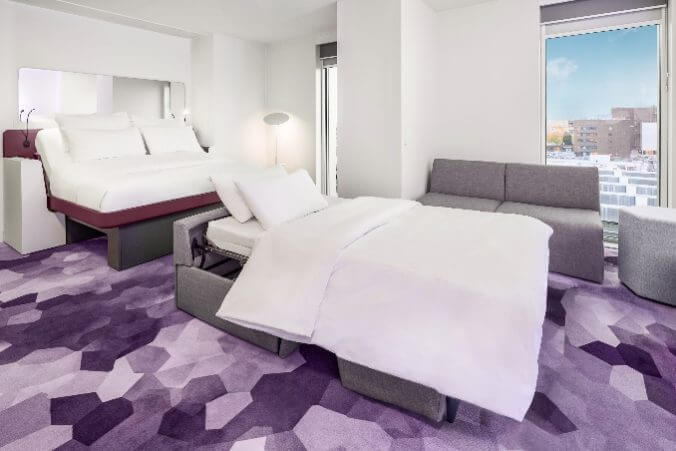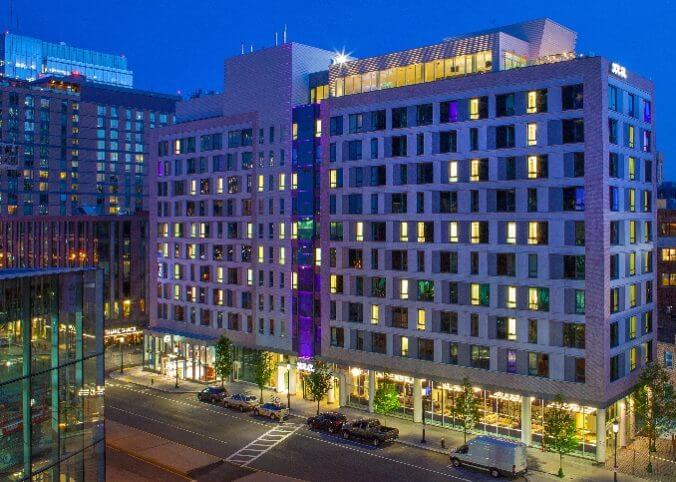Yotel Boston opened back in 2017, several years before the post-pandemic travel boom, but in the past six years it’s already become a go-to spot for business and budget travelers in the seaport area. On a recent Sunday night in October, the lobby was packed with guests checking in and out of rooms, stopping in for a meal at the newly-opened lobby restaurant, Vela Seaport, or grabbing a casual drink in the lobby bar. For a Sunday night, which is typically sleepy, the hotel was teeming with life. But that’s been the case for this brand since the beginning.
“We’re located in Boston’s newest bustling Seaport district so we see Yotel Boston as the perfect stay for any non-stop traveler who may be on the go for work or play,” says Trish Berry, the General Manager for Yotel Boston. “We offer our guests a seamless experience from check-in to check-out, from Smartkey room access and contactless check-in to tech-friendly amenities in each room, spanning our signature SmartBeds and mood lighting, as well as being able to grab a spot at our bar or dine at one of the hotel’s two on-site restaurants.”
Yotel Boston
Non-stop travelers, a.k.a. the ones with very little downtime who don’t really need a luxurious room to get by, traditionally meant business travelers. These days, it can also mean anyone eager to get back into traveling after the impact of the pandemic, or remote workers who are suddenly free to work from anywhere. Strong wi-fi, plentiful outlets, and common areas with great food and beverage are higher up on the hierarchy of needs for this type of traveler than a soaking tub or a massive king size bed. Instead, the hotel boasts a rooftop bar, Deck 12, as well as the ground floor restaurant, to give travelers plenty of larger spaces to hang out in addition to their rooms.
One of the newer brands oriented around the micro-hotel trend, Yotel founder Simon Woodroffe was rather infamously inspired by his seat on a first-class flight and the realization that a compact could still feel luxurious if it was designed properly. Drawing further inspiration from Japanese capsule hotels, which operate around a similar concept, and the cabins on board luxury yachts, Yotel was born. Clearly, something is resonating.

Yotel Boston room
In hospitality years, the brand really isn’t that old, but their success has been almost immediate. In 2007, the first Yotel opened inside London’s Gatwick Airport, followed quickly by another at Heathrow, and a third inside Amsterdam’s sprawling Schiphol Airport. These initial Yotel Air properties quickly gave way to a slew of Yotel locations in city centers (New York, Miami, San Francisco), and finally, Yotel Pads, or condos and apartments options. Their self-proclaimed goal is to open over 50 hotels by 2025, meaning Lisbon, Atlanta and Tokyo will join the portfolio over the next two years.
But the Boston location was just anchored to another property by a new partnership with JetBlue—another stylish but budget-conscious brand—who recently launched a direct flight between Boston and Amsterdam. Not only is the Yotel Air still in place at the airport, but another Yotel Amsterdam location, just outside the city, opened in the developing neighborhood of Noord in 2019. The onset of the pandemic immediately after means the hotel still has a brand new feel, and the direct between Massachusetts and the Netherlands gives guests a chance to hop between the two, racking up points and other rewards like late checkout or discounted rooms along the way. While the location in Amsterdam is admittedly a bit off the beaten path, it also gives travelers with the time and energy a chance to save money by avoiding the touristy, overpriced areas of town, and explore an emerging neighborhood at the same time.

Yotel Amsterdam room
“From our opening in 2019 to now, I’ve seen Noord truly develop into one of the city’s most exciting and thriving neighborhoods,” says Joy Maroulás, the General Manager of Yotel Amsterdam. “It’s infused with modern Dutch culture, filled with interesting architecture, new tech start-ups, edgy artists, and free-thinking chefs. Now we’re home to some of the trendiest restaurants in Amsterdam, like Cornerstore, a relatively new bar and restaurant created in what used to be a studio as well as creative spaces like the STRAAT Museum and NDSM Cultural Center, a former shipyard. ”
The property is about a 10 minute walk from a free ferry ride straight to the city center, and the hotel also offers guests bikes and umbrellas for hire, along with portable wi-fi devices available to rent on a daily basis. With their own on-site dining at Deck, and a substantial outdoor space overlooking one of the city’s many canals, there’s a certain charm to staying in what might be the Brooklyn of Amsterdam. There might not be a better place for a hotel brand trying to become an international player, and with clean, tech-oriented rooms that book for well under 200 Euros, the appeal isn’t just obvious—it’s indisputable.
Credit: Source link
